Could this be the Right Stuff?
The lead character in SpaceCamp is Andie Bergstrom (Kate Capshaw), a NASA-trained astronaut who was inspired by John Glenn’s first orbit around the Earth when she was a little girl and who now is quite frustrated that she keeps being passed over for shuttle mission, and most recently by a guy who even gets carsick. Her husband Zach Bergstrom (Tom Skerritt), who has walked on the moon, tries to console her with the news that she can now join him at Cape Canaveral as one of the instructors at Space Camp. I’m sure the idea of babysitting a bunch of kids trumps going into outer space.“Honey, last time I went into space I was eaten by a xenomorph.”
We are quickly introduced to our cast of “space campers” in the standard teen-comedy way; first there is Kevin Donaldson (Tate Donavon) a self-centered teen who is only at Space Camp because his dad promised him a jeep if he’d go, then there is Kathryn Fairly (Lea Thompson) an insanely driven teen who dreams of being the first female shuttle commander, next there is Rudy Tyler (Larry B. Scott) who apparently really loves science but is unfortunately not all that good at it, Tish Ambrosé (Kelly Preston) is a smoking hot girl who has the Valley Girl act down pat which is most likely an act to hide the fact that she is quite smart and has an eidetic memory, and finally there is Max Graham (Joaquin Phoenix) an eager 12-year-old boy who begs Andie to allow him to join the older space campers. None of these characters are given much time to flesh out; Kevin and Kathryn have the possible teen rom-com elements introduced but which are quickly forgotten once the actual plot gets going, Rudy and Tish are glorified supporting characters and barely have enough dialog to move them beyond two dimensionality, and Max really loves Star Wars which is all you really need to know about him.The film even gives him an A.I. robot named Jinx so he can have his own R2D2.
Now to say SpaceCamp isn’t all that scientifically accurate would of course be a gross understatement, but then again even modern big budgeted science fiction films like Gravity and Interstellar fumble occasionally when it comes to dealing with the hard science of space travel and working in outer space so I’m willing to cut this film a little slack there, where this film missteps is in the forty-five minutes leading up to the accident that sends our cast into space. We get the clichéd teen hijinks that can be found in countless other summer camp comedies but where those films are about teens hooking up Space Camp is supposed to be about teens trying to learn to be astronauts and director Harry Winer isn’t able to blend these elements together.It is certainly not helped by the fact that the chemistry between Lea Thompson and Tate Donavon is practically non-existent, which makes the abandoning of the particular subplot a good thing, and the stuff with little Max feeling ostracised by the older kids comes across as painfully lame. Luckily when the space stuff does begin to kick in the movie starts functioning on all thrusters.
But why exactly is NASA sending kids into space?
To get to the good stuff the writers of SpaceCamp unfortunately concocted what has to be the goofiest set of circumstances imaginable. Robot Jinx, who for some reason befriends Max, is not just next level A.I. but he’s an empathetic robot as well and one night he finds Max sobbing after being yelled for cock-blocking Kevin’s illicit date with Kathryn, which wasn’t even the kid’s fault as it was the robot who ratted them out, but Jinx overhears Max sniffle to himself, “I wish I was in space.” Now earlier it was established that Jinx takes all commands literally and so the robot decides to help his friend by orchestrating events that will lead to Max being sent into space. And how does a robot accomplish what would seem to be an impossible task? Well as it turns out NASA decides to let Andie bring a bunch of the kids aboard the Shuttle Atlantis during a routine engine test (I doubt NASA would ever let a group of kids inside a working shuttle let alone one that is about to fire off thousands of gallons of rocket fuel but without this bit of unbelievability we wouldn’t have a movie) and Jinx hacks the NASA mainframe and triggers "thermal curtain failure" that causes one of the boosters to ignite, which then forces Launch Control to ignite the second booster to avoid the ship crashing on the landing pad.Jinx is kind of like HAL 9000 if that computer had a heart and poor impulse control.
What follows is some pretty thrilling stuff as Andie and the kids have to work together to bring the shuttle back to Earth, the tension and drama in these scenes are beautifully performed and well put together, you just have to keep your suspension of disbelief on throughout this portion of the movie and maybe ignore a couple of moments of really corny dialog. Character arcs that were sloppily set-up in the first half of the movie actually get proper pay-offs here. Kevin learns to take responsibility and make tough decisions while Kathryn comes to understand that she can trust other people to do their jobs and that she doesn’t have to do everything herself. Meanwhile Max will have to save the day when they must retrieve oxygen tanks from a nearby space station (it’s under construction and uninhabited) and Andie is too big to make it through the scaffolding that surrounds the tanks so little Max dons a space suit and gets to be Luke Skywalker for a bit.The Force is with him.
The events aboard the shuttle are quite gripping and almost against my will I found myself sucked into this prefabricated space drama as problem after problem arose to threaten our heroes. Can these kids make it back to Earth before running out of oxygen? Will they regain radio contact with Mission Control? Can Kevin get over himself and make the tough call? How much money will the parents being suing NASA after all is said and done? The movie may have a fairly outlandish premise but once it gets going the filmmakers do their best to keep you from thinking about the implausibility of any given situation.Now let us take a look at some of those implausibilities:
• As mentioned there is no way NASA would allow kids inside a shuttle during a test launch.
• Launch Control loses contact with the shuttle because the Atlantis wasn’t flight ready and thus only has a short range radio. Was it sent out to be fixed?
• Andie doesn’t abort after the launch but for some reason she decides to continue on into space instead of immediately returning to the launch site or one of several other alternate landing areas.
• Andie’s helmet is too big for her to fit through the scaffolding to reach the oxygen tanks so they send out Max because he should be small enough, but the kid is wearing an adult sized space helmet so he should have been in the same boat and unable to reach the tank.
• Ground Control begins the autopilot sequence to bring the shuttle home which results in the cargo bays being closed and Andie being locked outside the shuttle. That NASA would close the cargo bay doors without knowing the whereabouts of the entire crew is ludicrous.
• Kevin overrides the autopilot enabling Max to rescue Andie but once she is rescued it is never explained why they can’t turn the autopilot back on.
• The shuttle goes into a flat spin so extreme I doubt a teenage girl would be able to pull out of it. Worse is that the special effects people gives us shots of it tumbling through space in manner that is in no way how a "flat spin" looks.
• The movie fails to end with a scene of Max beating the crap out of the robot with a crowbar.
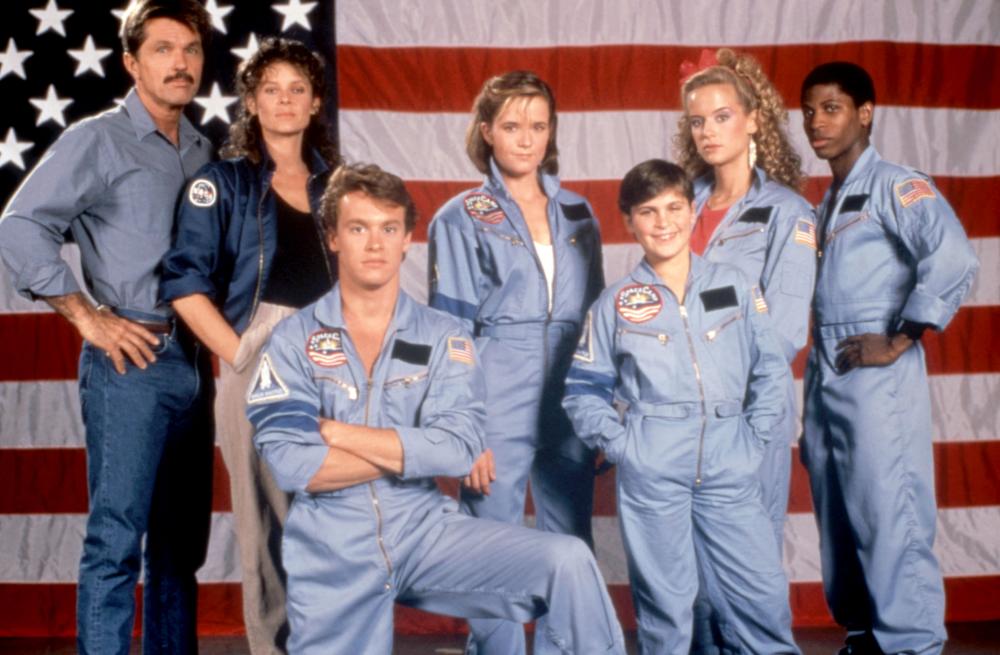

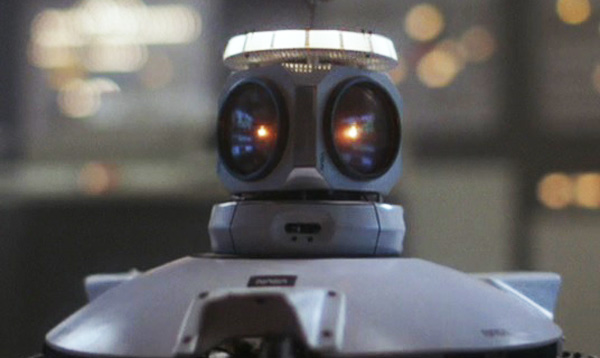
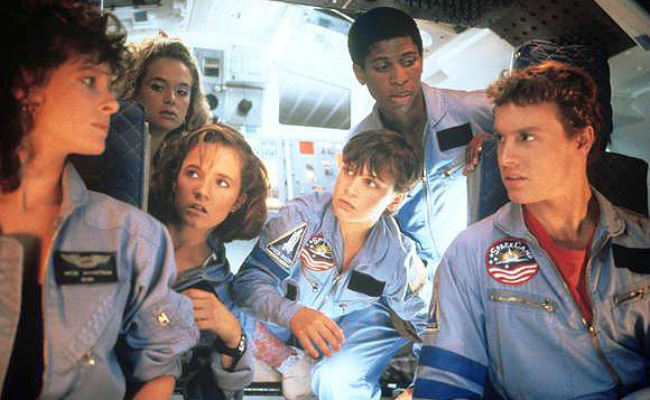
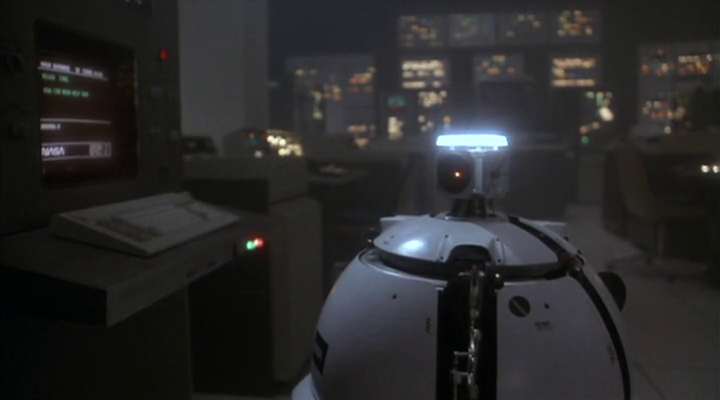

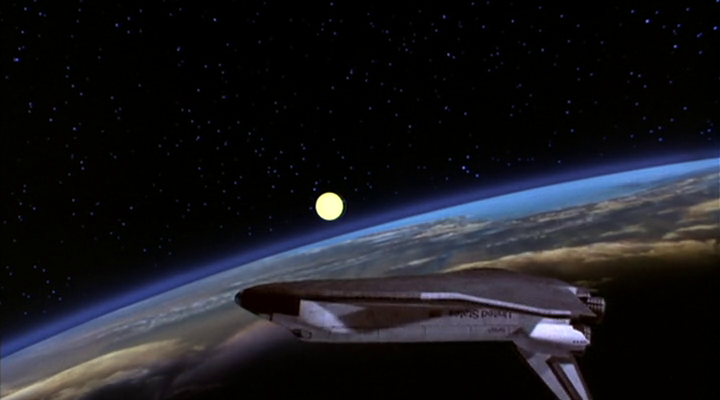

No comments:
Post a Comment